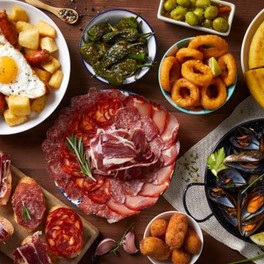What to Eat in Spain
 What to Eat in Spain
What to Eat in SpainSpain is renowned worldwide for its rich and diverse cuisine. The foundation of Spanish cuisine lies in fresh ingredients and regional flavors, making each dish unique in its own right. Seafood is a significant part of Spanish food culture, particularly in the eastern region of Spain, including Valencia, where fresh products from the sea are abundant. Paella, one of the most famous dishes from this region, is traditionally made with chicken, seafood, and vegetables. Halal versions of this dish are also available, making it accessible to Muslim travelers.
Tapas hold a special place in Spanish food culture. These small dishes are served in various restaurants, offering a wide range of flavors. Tapas are not only delicious but also offer halal-friendly options. Popular tapas include olives, vegetables, and small servings of meat or seafood. There is something for everyone, whether you prefer vegetarian dishes or seafood. Tapas restaurants are a great way to experience the diversity of Spanish cuisine in a casual setting.
Each region of Spain has its own culinary delights. In Barcelona, fresh seafood and Catalan dishes are the focus. The city’s seafood restaurants often feature a wide variety of fresh fish and seafood. Additionally, the famous Catalan dessert, Crema Catalana, is a must-try for those with a sweet tooth. In Madrid, cocido madrileño, a traditional stew, is a popular dish. This hearty stew, made with chickpeas, meat, and vegetables, is especially enjoyed during the colder months.
The Andalusian region offers lighter, refreshing flavors, with dishes like gazpacho. This cold soup, made from tomatoes, cucumbers, and peppers, is perfect for Spain’s hot summer days. Flamenquin, a meat-based dish, is another Andalusian specialty. Though traditionally made with pork, halal versions are available, allowing Muslim travelers to enjoy this regional treat. Andalusia is rich in Muslim and Spanish cultural heritage, which is reflected in the many halal food options available in the region.
Spain’s dessert culture is also diverse and delightful. Churros, long fried dough sticks coated in sugar, are commonly eaten for breakfast or as an evening snack. These treats are often served with hot chocolate for dipping. Halal-certified bakeries offer churros with a variety of options, making them accessible to Muslim visitors. Another popular Spanish dessert is turron, a nougat made from almonds and honey, often enjoyed during the holiday season.
Local markets in Spain offer a fantastic opportunity to explore Spanish cuisine. These markets provide fresh fruits, vegetables, and seafood, giving visitors a chance to taste the authentic flavors of Spain. Walking through the local markets is a great way to learn more about traditional Spanish food and experience the local culture. In addition to food, many markets also offer unique handmade goods and crafts.
Halal food options are widely available in Spain, particularly in major cities like Barcelona, Madrid, and Valencia. These cities have many halal-certified restaurants and grocery stores, making it easy for Muslim travelers to find suitable dining options. In addition, large shopping centers often have dedicated halal food sections. Therefore, Muslim travelers can rest assured that they will have plenty of halal-friendly choices during their visit to Spain.
Other Contents

